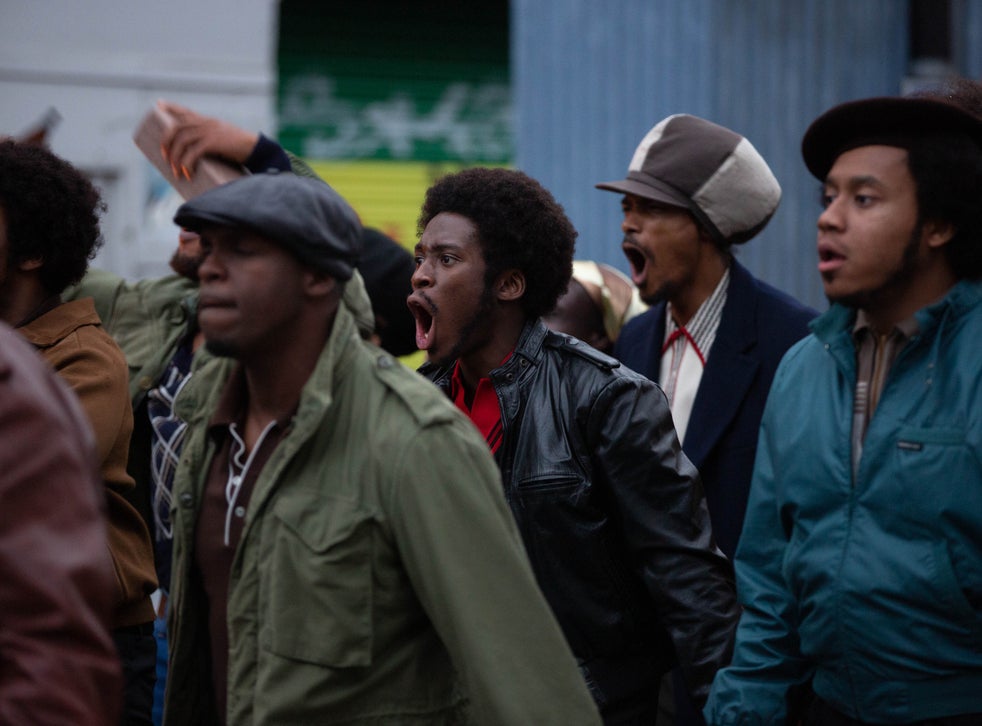The fourth and penultimate film in the Small Axe series tells the true story of Alex Wheatle, now a celebrated author, who turned his life around after being jailed over the Brixton riots in 1981. The story unfolds in three timeframes. In the opening, we see Alex (Sheyi Cole) shuffling into prison, terrified and nearly mute, furious at finding himself here, convinced he is marked for something better. His cellmate is an enormous rasta, Simeon (Robbie Gee), who’ll become a father figure, encouraging him to read to educate himself.
Prison reminds Alex of his childhood in a grim care home in Shirley Oaks, Surrey, where he is played by Asad-Shareef Muhammad. He’s a friendless boy, abused by his peers as well as the burly woman (Ashley McGuire) charged with his care. As a teenager, he moves to Brixton to try to make his way in the world. He’s a fish out of water. Despite his tough early years, he doesn’t speak patois, he wears the wrong clothes, and sounds like a nice middle-class boy. He’s not African, he explains to a bemused barber; he’s from Surrey. But it doesn’t take long before he starts to assimilate, under the tutelage of Dennis (Jonathan Jules), getting into drugs and music. It’s an appealing debut performance from Cole, as the ingenue with a violent streak, who realises that the Brixton of the early 1980s is not somewhere a young black man can try to be neutral.
The turning point is the New Cross house fire on 18 January 1981, in which 13 young black men and women are killed in a suspected far-right arson. The film briefly switches to documentary, as Lynton Kwesi Johnson reads his poem “New Crass Massahkah” over real-life news photographs of the burnt out house, the funerals, and the subsequent protests. It’s one of the provocations that will lead to the riots a few months later.

Alex Wheatle (Sheyi Cole) amid civil unrest in Steve McQueen’s Small Axe
(BBC/McQueen Limited/Will Robson-Scott)
Alex Wheatle is more conventional than the other films so far, but it feels slighter than Mangrove and Red, White and Blue, and lacks the lusciousness of Lovers Rock. That’s not a strident criticism. They set a high bar. It’s reassuring that Sir Steve McQueen, Oscar-winning Hollywood megastar, produces work of a different calibre to Joe Bloggs TV director, and credit should also go to the director of photography, Shabier Kirchner. Every shot feels built to last. The most lingering image is of Alex on the floor of the school gym, bound in a straitjacket after a fight with a racist classmate, but there’s attention to detail everywhere you look. When Alex is in prison, we see him from above, the screen bisected by a wall: on one side, barbed wire and confinement, on the other, freedom.
Given the personnel and subject matter, Small Axe was always likely to be one of the stand-out TV events of the year, but it has exceeded expectations. At this point, the fifth instalment, next week’s Education, could just be an hour of McQueen reading out his Wikipedia entry and Small Axe would still be a landmark achievement, a masterful exploration of a period in British history that hasn’t, until now, had the treatment it deserves.









